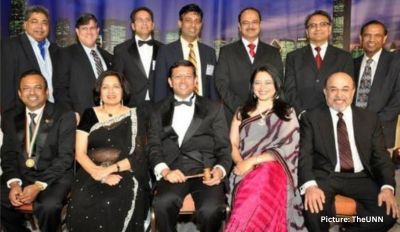Indian American journalist MeghaRajagopalan has won the United States’ top journalism award, the Pulitzer Prize, for innovative investigative reports harnessing satellite technology that exposed China’s mass detention camps for Muslim Uighurs and other minority ethnicities, Pulitzer Board announced on June 11th, 2021.
The 2021 award in the International Reporting category has been shared by MeghaRajagopalanwith two colleagues from the internet media, BuzzFeed News. When China had started to detain Muslims in Xinjiang, Megha was the first journalist to visit a detention camp in 2017. China had denied such places existed and had her visa revoked. She was forced to leave the country. Working from London, she along with Alison Killing, an architect specialising in forensic analysis of architecture and satellite images of buildings, and Christo Buschek, a programmer who builds tools tailored for data journalists, investigated and published one of the worst human rights abuses in history.
 Another Indian American journalist, Neil Bedi, won a Pulitzer in the Local Reporting category for investigative stories he wrote with Kathleen McGrory for exposing the Sheriff’s Office in Pasco County’s program that could identify people believed to be future crime suspects using computer modelling. Nearly 1,000 people including children were monitored under the program.
Another Indian American journalist, Neil Bedi, won a Pulitzer in the Local Reporting category for investigative stories he wrote with Kathleen McGrory for exposing the Sheriff’s Office in Pasco County’s program that could identify people believed to be future crime suspects using computer modelling. Nearly 1,000 people including children were monitored under the program.
Bedi and Kathleen McGrory were given their award for exposing “how a powerful and politically connected sheriff built a secretive intelligence operation that harassed residents and used grades and child welfare records to profile schoolchildren,” the Pulitzer Board said. Bedi, who has a degree in computer science, is now a Washington-based reporter for ProPublica. He was a finalist for the Pulitzer Prize in 2019. This is the 105th year of the Pulitzer Prizes awarded by a board at Columbia University’s Graduate School of Journalism in New York recognizing outstanding work.The Pulitzer Prize is awarded yearly in twenty-one categories with each winner receiving a certificate and a $15,000 cash award. The winner in the public service category is awarded a gold medal.
In recognition of the proliferation of citizen journalism in the internet age, teenaged non-journalist Darnella Frazier was awarded a Pulitzer Special Citation for her courage in filming the killing of George Floyd, the African-American who died in police custody in Minneapolis last year. MeghaRajagopalan along with Alison Killing and Christo Buschek bagged the award for exposing a vast infrastructure of prisons and mass detention camps secretly built by China. The prisons had detained and housed thousands of Muslims in the Xinjiang region.
 The video clip made on her smartphone go viral and set off prolonged nationwide protests against police brutality and led to measures in many states and cities to reform policing. The sight of a policeman kneeling on the neck of dying Floyd as he repeated, “I can’t breathe,” appealed to America’s conscience and led to a broader consideration of the problems faced by African-Americans. The Board said her that her video “spurred protests against police brutality around the world, highlighting the crucial role of citizens in journalists’ quest for truth and justice.” Rajagopalan and her colleagues used satellite imagery and 3D architectural simulations to buttress her interviews with two dozen former prisoners from the detention camps where as many as a million Muslims from Uighur and other minority ethnicities were interned. “I’m in complete shock, I did not expect this,” she said.
The video clip made on her smartphone go viral and set off prolonged nationwide protests against police brutality and led to measures in many states and cities to reform policing. The sight of a policeman kneeling on the neck of dying Floyd as he repeated, “I can’t breathe,” appealed to America’s conscience and led to a broader consideration of the problems faced by African-Americans. The Board said her that her video “spurred protests against police brutality around the world, highlighting the crucial role of citizens in journalists’ quest for truth and justice.” Rajagopalan and her colleagues used satellite imagery and 3D architectural simulations to buttress her interviews with two dozen former prisoners from the detention camps where as many as a million Muslims from Uighur and other minority ethnicities were interned. “I’m in complete shock, I did not expect this,” she said.
According to the publication, she and her colleagues, Alison Killing and Christo Buschek, identified 260 detention camps after building a voluminous database of about 50,000 possible sites comparing censored Chinese images with uncensored mapping software. Rajagopalan, who had previously reported from China but was barred from going there for the story, traveled to neighboring Kazakhstan to interview former detainees who had fled there, BuzzFeed said. “Throughout her reporting, Rajagopalan had to endure harassment from the Chinese government,” the publication said. The series of stories provided proof of Beijing’s violation of Uighurs’ human rights, which some U.S. and other Western officials have called a “genocide.”











